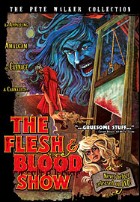
A pioneer of the perverted set-piece, director Pete Walker began charting the dark (and often bloody) byways of the human condition during a cultural era when cinematic horror was still primarily devoted to the polite terrors of Hammer and the dark 'monster mash' parodies of Amicus. Making Britain bleed, Walker's surprisingly violent and sexually explicit exploitation pictures brought a daring new look to the genre. He also ushered in a new age of social relevance, lending emotional and political substance to his outlandish premises, rooting fables of psychosis within troubling contexts that were as devoted to cultural criticism as sensationalism. For as moodily photographed and disturbing as Walker's films are, celebrating violent death, madness, and the struggle of incompetent characters to survive a world turned upside down, the most impressive element of his filmography are the philosophical cores rooted deep within their heart. Walker's films will be remembered primarily for their harsh condemnation of abused political power, religious fanaticism, and the breakdown of family. The Flesh And Blood Show, while not as philosophically motivated as such efforts as Frightmare or The Confessional, is just as disturbing, depicting in gruesome shades of crimson and shadow the haunted byways of the twisted human heart.
A randy group of young actors and actresses gather at a deteriorating theatre at the end of a pier to audition for a "Grand Guignol" show. Hired by the enigmatic "Theater Group 40" to perform 'The Flesh and Blood Show', the thespians are soon murdered in deliciously demented ways. While the basic structure is nothing unique, similar to several of Hammer's early psycho-thrillers, and the plot is clearly indebted to the 'body count' sub-genre -- a trend instituted by Agatha Christie's Ten Little Indians -- this fetishistic ode to sin and punishment is original in its depiction of the dangers of fanaticism and the all too human hunger for revenge. Owing as much to the grim morality of the Hebrew Old Testament as to Walker's scathing penchant for dissecting the status quo from within its self-righteous core, The Flesh And Blood Show is a study of misguided, psychotic fervor and an early example of the slasher sub-genre. Mixing blood with brains, and brutality with surprising sensitivity, clever writing is given subversive life by Walker's intimate camera movements. The gloomy atmosphere of the post-season British coastal resort lends still more depth to the elegant sleaze, shadows and sin-drenched interiors providing a luscious context to decapitations, death-by-drowning, psychotic senior citizens, and bare ass.
Maligned when he should be honored, Walker exposes the pale bones of cultural intolerance whilst exploiting it. Peeling back the wounds of English society, he attacks the attackers in this appropriately titled vivisection of the 'holier than thou' attitudes which have caused so many conflicts in our culture. More importantly, he achieves his criticisms without crass moralizing, knowing that his first goal is to entertain. Saving preaching for the pulpit, deeper levels of meaning are nevertheless available beneath the splattery surface action, surrounded by fast-paced thrills, grue, and nudity for those who paid their ticket for nothing more than sensation. That Walker can achieve both showmanship and intellectual substance makes him one of the superior filmmakers of his period.
Perhaps Walker's greatest achievement in The Flesh And Blood Show - and the one that often courted the most controversy - was the unflinching honesty with which he captures the malignance of those people who use a devotion to 'morals' to justify their own sick behaviors. While not as intelligently written or emotionally incisive as his best, this grimy ballet of terror and death is easily as enjoyable and scintillating as anything else than came out of the period. Nothing is sacred in his amoral universe, and the body is often no more than meat. Delighting in the art of murder -- and the creative kill set-piece -- Walker instills his contemporary adult faerie tale-cum-murder mystery with the energy and fetish of a Giallo. By approaching death as both spectacle and tragic waste, he indulges in the very crimes he condemns. Even more disturbing? The sense of intimacy which he finds between murderer and victim. Slowing down time, Walker depicts violent death as an almost loving dance between victim and victimizer, encouraging audiences to become an active participant in the act. A bold action by a filmmaker who welcomed controversy.
A worthy addition to the Walker library, this Shriek Show offering is remastered yet grain, speckling, and lines remain throughout -- no doubt due to the condition of the original negative. Audio is in Dolby Digital 2.0. Extras include the original trailer, a representative photo gallery, a Pete Walker trailer gallery, and a substantial interview. Produced by William Hellfire, "Pete Walker: A Man Of Flesh And Blood," is a thought-provoking examination of Walker's career and aesthetic leanings. Intimate and introspective, Walker looks relaxed discussing his days as an exploitation pioneer, talking unashamedly about his contributions while coming across as refreshingly humble. We hear him was poetic on everything from memories of principle cast members to the problems he faced with censors, making sound points on the commercial nature of genre cinema and the reason he stopped working in the field. A fine talk indeed!
Review by William P. Simmons
| Released by Shriek Show |
| Region 1 NTSC |
| Not Rated |
| Extras : see main review |